The preservation and resilience of previously built and aging infrastructure is attracting more and more interest from the engineering community. This topic is becoming even more critical as the effects of climate change are ever increasingly felt worldwide and its ubiquitous effects are impacting all aspects of engineering, including geotechnical engineering (AKA Geostructures).
Geostructures provide essential supports to the infrastructures which directly benefit communities (i.e., foundations for building loads, dam and levees for protecting residents in flood zones, seawalls for coastal communities, retaining walls for transportation systems, highway and railway embankment on warm permafrost, etc.). Already built geostructures and natural geosystems are subjected to increasing failure risks brought on by rapidly changing climatic patterns.
The consequence of geostructure failures are catastrophic and severely threaten the sustainability of our communities. The next stage of geotechnical engineering practice must incorporate risk factors into the designing process, as well as see the active retrofitting of at risk current geostructures.
This requires that we develop and integrate new methods, tools, and protocols for georisk scenery assessment and risk-based geoengineering design.
This Topical Collection of papers welcomes manuscripts dealing with the preservation and resilience of geostructures.
All submissions must not have been previously published or under consideration for publication elsewhere. This issue will be an online-only topical collection of papers. Once accepted, the paper will immediately enter the online publishing process and be available to read and access without delay.
Topics of interest (not limited to):
- Probability and risk-based design of geostructures
- Effects of climate change on geostructures (dams, levees, road embankments, railways, retaining walls, coast lines, etc.)
- Climate change impact on cold regions geotechnical engineering
- Dam failure analyses and dam operation coordination for flood risk mitigation
- GIS and remote sensing for assessment of geohazards
- Geohazards mitigation: case studies
- Machine learning for geotechnical risk assessment and decisions
- Other related topics
Guest Editors:
Xiong (Bill) Yu, Ph.D., Professor, Case Western Reserve University
Email: xxy21@case.edu
Zhaohui (Joey) Yang, Ph.D., Professor, University of Alaska Anchorage
Email: zyang2@alaska.edu
Jiankun Liu, Ph.D., Professor, Sun Yat-Sen University
Email: liujiank@mail.sysu.edu.cn
Submission instruction:
Please submit manuscripts via the online submission system at https://www.editorialmanager.com/jipr/ and follow the submission guidelines at https://jipr.springeropen.com/submission-guidelines.
All manuscripts submitted to this collection should be indicated in the online system otherwise they will be handled as regular submissions.
Open Access Publication:
Submissions will also benefit from the usual advantages of open access publication:
Rapid publication: Online submission, electronic peer review and production make the process of publishing your article simple and efficient
High visibility and international readership in your field: Open access publication ensures high visibility and maximum exposure for your work - anyone with online access can read your article
No space constraints: Publishing online means unlimited space for figures, extensive data and video footage
Authors retain copyright, licensing the article under a Creative Commons license: articles can be freely redistributed and reused as long as the article is correctly attributed.
Stay up to date with JIPR:
Sign up for article alerts to keep updated on articles published in Journal of Infrastructure Preservation and Resilience - including articles published in this topical collection.
